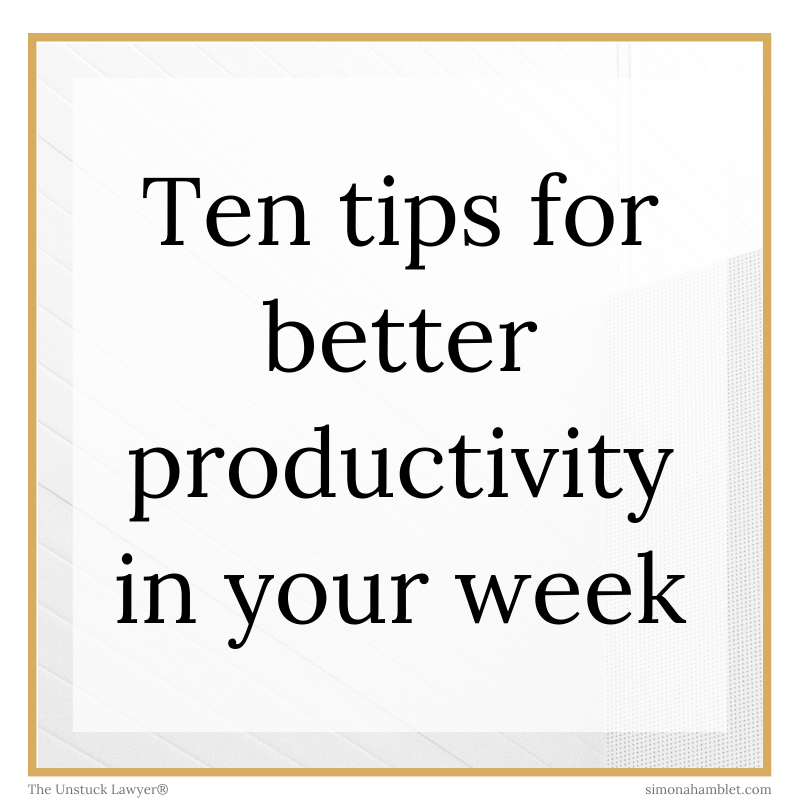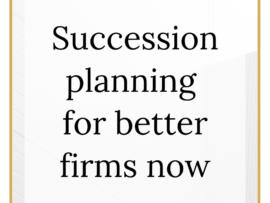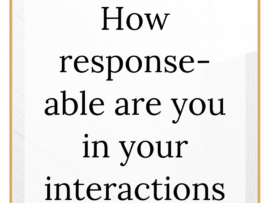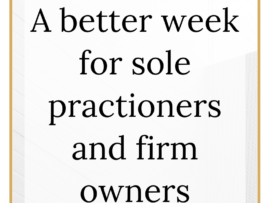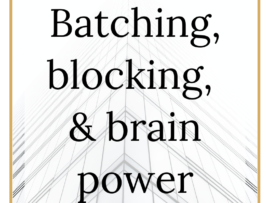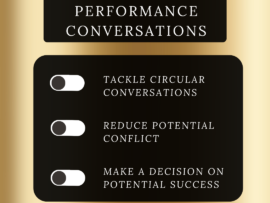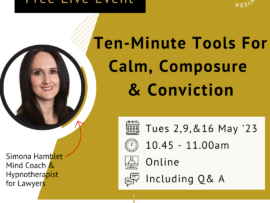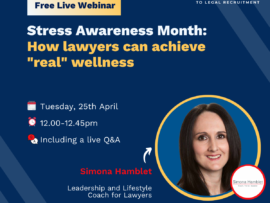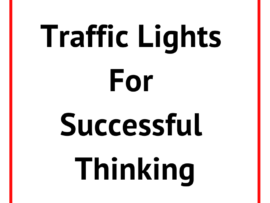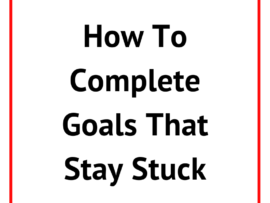10 Time Tips For Daily Productivity At Work
0 Comments10 Time Tips For Daily Productivity At Work
Are you regularly working long hours? Feeling overwhelmed? Never enough time?
If you have a reasonable(ish) workload, but, find that your productivity and prioritisation isn’t great, here are 10 tips to help. Scroll through the headings to see which catches your eye.
- Do ‘That’ Thing First
Do you have something you know you need to do, but for some reason it is too draining. If you can’t swap the job with someone else (and agree to take their ‘draining job’ in return), plan to tackle the call, or limit yourself to 10 minutes of the task, before you do anything else. If you decide to continue after 10 minutes, you can do so, if not stop at 10 minutes (otherwise you won’t believe yourself next time). You will feel better for having taken action, and find the day easier. Otherwise you will just spend the day worrying about the thing.
- Prioritise Profit
Deal with the money-making work as a priority. Marketing comes second but MUST be done to ensure you have money-making work. However, if you aren’t getting around to other tasks, including management and admin, you will need to look at your workload, or the other areas in which you can improve your efficiency.
- Use Your Team and Tech
With good training and clear understanding, your receptionist, assistant or junior staff member, can protect you from unnecessary interruptions, and deal with routine tasks and correspondence. They can collate useful information at the start and support you throughout. Effective delegation to all of your team is a skill worth learning.
Likewise using apps and other tech is a must these days, it takes time to learn, but then it makes a difference.
- SOP’s (Standard Operating Procedures)
Put into place your standard processes. An easy way to do this, is to do it as you go.
Grab a notebook and folder if you prefer pen and paper, or create a folder online. Then over the next few weeks or couple of months (depending on the cycle of your typical work):
- make a note of all the repeated steps you, and others, take during a transaction or process
- save forms and letters used, as you go
- notice any conversations you repeatedly have, or emails you regularly write. Again start recording/saving them and create templates (you might want to also add them to your FAQ section on your website).
- jot down what information you keep having to look for and how hard it is to find it, make tweaks as you go where possible
- record how many times, and for what, you have to go back to the client for more information, and consider what to change to limit this
- add dates to actions and tasks in your matters, this can show a timeline, and where the process might be slowest
You can then use this information to tweak client experiences, record and streamline your systems, draft or update standard letters or emails, create checklists, even produce a basic script for others to use. All of which will save you time, improve client service, and let you focus on the important stuff.
- Declutter
Unsubscribe from magazines or emails you don’t find useful or enjoy. They waste your time, are a distraction, and lead to you having more unnecessary to-do’s. Feeling you really ‘should’ read that article? Does it take you one step closer to your profit goal or development goal? No? Unsubscribe. (My articles are, of course, excellent and well worth saving to read.)
Declutter your desk and your home, upgrade what you can. It all helps save time and energy. If your eyes are constantly noticing a mess or a diy task, you will be distracted. Take a look at Marie Kondo’s book on decluttering. If nothing else, getting everything out and into one place, makes a huge difference.
- Email Economy
With emails, set some guidelines in your business. Ensure understanding of the difference between ‘To’ (this usually means action or an expectation of a response) and ‘CC’ (this usually means FYI only, and for key matters). Think twice about who is included in the email. One of the biggest changes for me came from setting up a delay in Outlook to prevent emails being sent instantly. This has stopped several oops messages, or that typical hitting send, and then remembering something else (there are reasons why this happens, it is not a lack of attention to detail).
- Switch Off Notifications and Batch
Be honest about how often you check your emails, or take calls when you are in the middle of a task. Be equally honest about how often you need to check them. Every time you are distracted by a notification (sound or visual) it uses up mental energy, tiring your brain as it switches focus, even if you did not read the email/message.
Do your best to set times to check messages (emails/text/calls). Fewer notifications and distractions, along with fewer task switches, means staying more alert later into the day. Batching tasks, such as emails, or calls, saves time and decreases mental fatigue.. This will usually mean fewer mistakes, tasks taking less time, and fewer poor-decisions by the end of the day/week
- Deadlines
Excellent customer service may not involve immediate or same day action (although it usually requires prompt acknowledgment). Sometimes clients would actually quite like a few days without having to deal with a task they have just got off their to-do list!
Is it truly urgent, or do you treat everything as urgent? We can often have discomfort delaying tasks, and treat emails and calls as intrinxically urgent.
When agreeing to a piece of work, so to better manage your workload, and expectations, have a conversation with the client about when they will have time in their diary to action the next steps (not when they want you to complete it). How many times have you turned something around quickly, only to receive an out-of-office response or a long delay in response? Talking to a client can also help you understand why a deadline was set. It could be there is a misunderstanding of the process.
One other point. If a client consistently contacts you at the end of the day, after working hours, or with short notice of urgent work (even though they have had ‘it’ for a while), then they know you regularly work late, or will somehow fit them in. This can cause a great deal of stress for you as it makes more and more of your work unnecessarily urgent. You therefore need to gently re-establish boundaries with them, which is achievable.
9. Plan Your Day
Whilst the last of the tips, it really is the top tip. Depending on the work you do, you may be able to plan most of your day. For others it is more reactive. The best time tip is to set your (genuine) Three Most Important Tasks, at the start of each day, and likewise plan the key tasks for the week before the week begins. Doing this every day will make you more efficient and productive. If the task doesn’t take you closer to your profit, service, life-balance, or career goals, double check it is actually a most important task.
10. Reflections Of Your Mind
Productivity can be impacted by many different thoughts, traits, and behaviours. It would be an even longer article if I covered all aspects of mindset and productivity.
So to give you an example of the impact on your mindset, let’s focus on one aspect. Working to your contracted hours.
There are many mindset and behavioural reasons for people to work late (or go in very early). These can include:
- using it to avoid being at home (loneliness, unhappy relationships)
- it has become habit (if your working hours are until 5pm, yet you always work until 6pm, this is probably habit)
- lack of confidence or assertiveness, or wanting to avoid conflict (this could be related to a boss, or team member)
- to fit in with a ‘culture’
- wanting to be in control, perfectionism, unwilling to delegate, fear of saying ‘no’ or asking for help
- it feels good to be able to ‘boast’ about the long hours worked, or to feel ‘needed’
Awareness is key, we can then start to tweak and adopt new approaches.
If you know what you want to make a change, but know you are getting in your own way, let’s talk.
Ready to have more time in your life? Make a big change? Feel free to breathe? Book a video call here and let’s explore the changes you can make. Clients frequently have extra hours back in their week by making changes.
Simona
